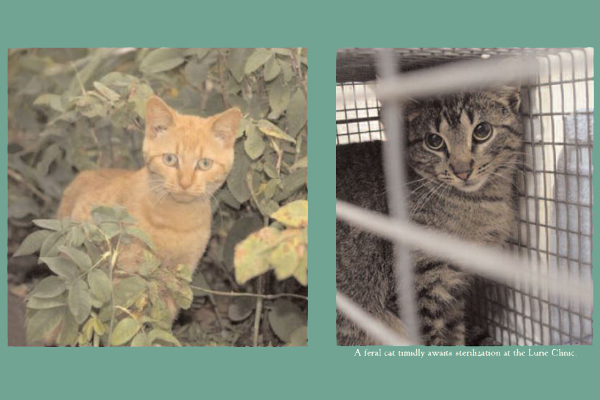Combating Cat Overpopulation: Trap-Neuter-Return
Apr 30, 2006

We seldom see them, and if we do may mistake them for pets on the prowl or strays. Yet there are an estimated 60 to 80 million feral cats in the United States, and they are capable of reproducing at a staggering rate, exacerbating an already tragic overpopulation problem. But thanks to a growing number of organizations and individuals practicing new humane methods of managing these populations, and to programs such as the year-round low-cost feral spay/neuter program at the Lurie Family Clinic, there is hope.
Feral means “gone wild” and is a term applied to domesticated cats that have reverted to a wild state after being lost or abandoned, as well as to cats born on the street who have never been socialized to human contact. They live in family groups called colonies and can be found in any urban or rural location where there is a food source.
Although they are commonly confused, stray cats and true ferals have different behavior patterns. A stray cat may be seen at any hour, will likely approach a human even if cautiously, is often vocal, and will eat food if you put it down. A feral, on the other hand, generally will only be seen from dusk until dawn, will not approach humans, is silent, and will not eat food you have put down in your presence.
Until 10 or 15 years ago, the most common method of dealing with feral cats in the United States was to trap and kill them – a cruel solution that didn’t even begin to address the cat overpopulation problem. Since then a more human and viable control program long practiced in the United Kingdom, other parts of Europe, and Africa has come into favor.
Known as Trap-Neuter-Return, or TNR, the method is described by the national feral cat resource Alley Cat Allies as “a full management plan in which stray and feral cats, already living outdoors in cities, towns, and rural areas are humanely trapped, then evaluated, vaccinated, and sterilized by veterinarians. Kittens and tame cats are adopted into good homes. Healthy adult cats too wild to be adopted are returned to their familiar habitat under the lifelong care of volunteers.”
While strays and kittens often find homes, the process of attempting to socialize adult feral cats is a long and arduous one with limited success. And even if a feral should bond, it is usually with just one person and not with humans in general.
Trap-Neuter-Return is the preferable approach to handling the feral cat problem because it advocates life over death and effectively limits the number of cats born on the street.
At present, thousands of individuals and groups across the country have adopted TNR as a part of their efforts to support managed colonies of feral cats. These caretakers regularly monitor the colony, providing food and shelter from inclement weather as well.
TNR involves humanely trapping the cats and bringing them in for sterilization to veterinarians versed in the handling of ferals. In addition to being spayed or neutered, the animals are vaccinated and treated for such common medical problems as parasites. Their ears are tipped, so that animals who have already been sterilized will be readily identifiable in the future. The cats are then returned to the location where they were trapped.
In the Chicago area, the groups promoting Trap- Neuter-Return as a critical component of feral cat colony management include the Chicagoland Stray Cat Coalition and People and Animals in Community Together (PACT). They can bring them into PAWS Chicago’s Lurie Family Clinic to be spayed or neutered and treated for $17.
TNR offers feral cats, long ignored by human neighbors who hoped that they would just go away or be killed by animal control agencies, a chance to live safe, healthy lives without reproducing.
If you would like to learn more, the book TNR Past Present and Future: A History of the Trap/Neuter/Return Movement, by Ellen Perry Berkeley, is available from PAWS Chicago. Go to the Gift Shop at the PAWS Chicago website (www.pawschicago.org) or send a check for $20.95 (includes shipping and handling) to PAWS Chicago, 1110 W. 35th Street, Chicago, IL 60609.
Helpful websites include:
Legislation related to Trap-Neuter-Return varies by location. Anyone interested in becoming involved in TNR should consult local ordinances.
